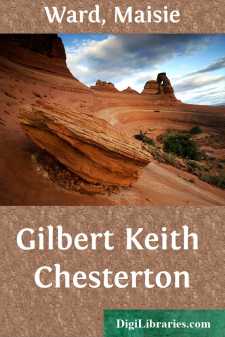Categories
- Antiques & Collectibles 13
- Architecture 36
- Art 48
- Bibles 22
- Biography & Autobiography 813
- Body, Mind & Spirit 142
- Business & Economics 28
- Children's Books 14
- Children's Fiction 11
- Computers 4
- Cooking 94
- Crafts & Hobbies 4
- Drama 346
- Education 46
- Family & Relationships 57
- Fiction 11829
- Games 19
- Gardening 17
- Health & Fitness 34
- History 1377
- House & Home 1
- Humor 147
- Juvenile Fiction 1873
- Juvenile Nonfiction 202
- Language Arts & Disciplines 88
- Law 16
- Literary Collections 686
- Literary Criticism 179
- Mathematics 13
- Medical 41
- Music 40
- Nature 179
- Non-Classifiable 1768
- Performing Arts 7
- Periodicals 1453
- Philosophy 64
- Photography 2
- Poetry 896
- Political Science 203
- Psychology 42
- Reference 154
- Religion 513
- Science 126
- Self-Help 84
- Social Science 81
- Sports & Recreation 34
- Study Aids 3
- Technology & Engineering 59
- Transportation 23
- Travel 463
- True Crime 29
Gilbert Keith Chesterton
by: Maisie Ward
Categories:
Description:
Excerpt
INTRODUCTION
Chiefly Concerning Sources
THE MATERIAL FOR this book falls roughly into two parts: spoken and written. Gilbert Chesterton was not an old man when he died and many of his friends and contemporaries have told me incidents and recalled sayings right back to his early boyhood. This part of the material has been unusually rich and copious so that I could get a clearer picture of the boy and the young man than is usually granted to the biographer.
The book has been in the making for six years and in three countries. Several times I hid it aside for some months so as to be able to get a fresh view of it. I talked to all sorts of people, heard all sorts of ideas, saw my subject from every side; I went to Paris to see one old friend, to Indiana to see others, met for the first time in lengthy talk Maurice Baring, H. G. Wells and Bernard Shaw; went to Kingsland to see Mr. Belloc; gathered Gilbert's boyhood friends of the Junior Debating Club in London and visited "Father Brown" among his Yorkshire moors.
Armed with a notebook, I tried to miss none who had known Gilbert well, especially in his youth: E. C. Bentley, Lucian Oldershaw, Lawrence Solomon, Edward Fordham. I had ten long letters from Annie Firmin, my most valuable witness as to Gilbert's childhood. For information on the next period of his life, I talked to Monsignor O'Connor, to Hilaire Belloc, Maurice Baring, Charles Somers Cocks, F. Y. Eccles and others, besides being now able to draw on my own memories. Frances I had talked with on and off about their early married years ever since I had first known them, but she was, alas, too ill and consequently too emotionally unstrung during the last months for me to ask her all the questions springing in my mind. "Tell Maisie," she said to Dorothy Collins, "not to talk to me about Gilbert. It makes me cry."
For the time at Beaconsfield, out of a host of friends the most
valuable were Dr. Pocock and Dr. Bakewell. Among priests, Monsignors
O'Connor and Ronald Knox, Fathers Vincent McNabb, O.P. and Ignatius
Rice, O.S.B. were especially intimate.
Dorothy Collins's evidence covers a period of ten years. That of H. G. Wells and Bernard Shaw is reinforced by most valuable letters which they have kindly allowed me to publish.
Then too Gilbert was so much of a public character and so popular with his fellow journalists that stories of all kinds abound: concerning him there is a kind of evidence, and very valuable it is, that may be called a Boswell Collective. It is fitting that it should be so. We cannot picture G.K. like the great lexicographer accompanied constantly by one ardent and observant witness, pencil in hand, ready to take notes over the teacups. (And by the way, in spite of an acquaintance who regretted in this connection that G.K. was not latterly more often seen in taverns, it was over the teacups, even more than over the wine glasses, that Boswell made his notes. I have seen Boswell's signature after wine—on the minutes of a meeting of The Club—and he was in no condition then for the taking of notes....


